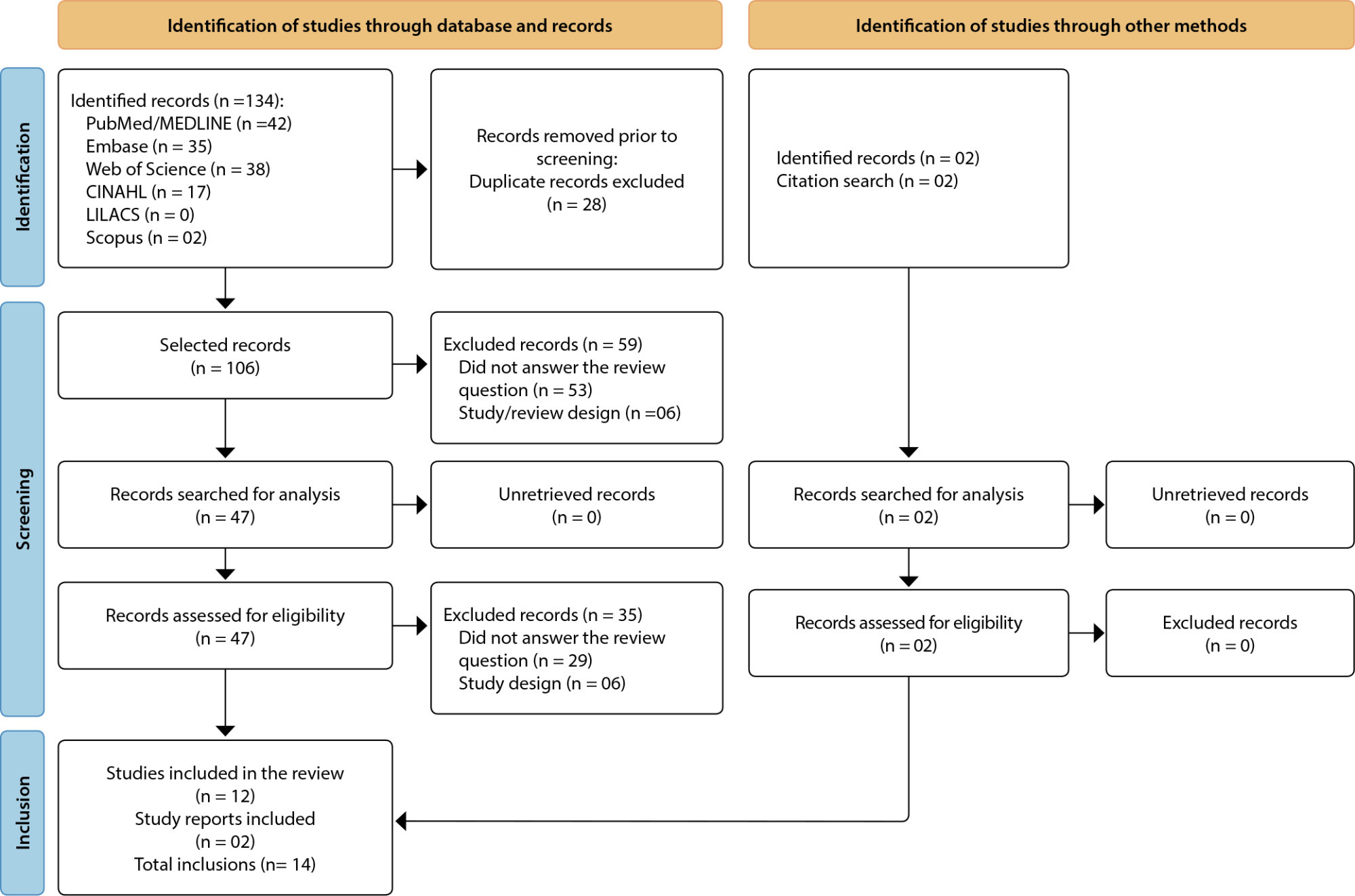-
Maternal Concerns in Home Care for the Premature Newborn: An Integrative Review
Revista Brasileira de Enfermagem. 2023;76(6):e20220769
Abstract
Maternal Concerns in Home Care for the Premature Newborn: An Integrative Review
Revista Brasileira de Enfermagem. 2023;76(6):e20220769
DOI 10.1590/0034-7167-2022-0769
Views0See moreABSTRACT
Objective:
To identify and analyze the scientific literature, both national and international, concerning the primary maternal concerns about caring for premature newborns at home.
Methods:
This integrative review is based on the guiding question: “What scientific publications from 2012 to 2021 address maternal concerns about the care of premature newborns at home?”. Searches were conducted in the electronic databases: Embase, Medline, Web of Science, Lilacs, Scielo, and Cochrane Library.
Results:
A total of 21 articles were identified. The qualitative analysis showed that maternal concerns pertained to breastfeeding, hygiene, sunbathing practices, managing infant colic, identifying signs, symptoms, and clinical changes, temperature control, and the third phase of the kangaroo method.
Conclusions:
Maternal uncertainties underscore the importance of enhancing strategies focused on supporting families and ensuring continued care for neonates at home.

-
ORIGINAL ARTICLE12-04-2023
Psychometric Properties of an Instrument for Assessing University Administrators’ Knowledge on Gender-Based Violence
Revista Brasileira de Enfermagem. 2023;76(6):e20220770
Abstract
ORIGINAL ARTICLEPsychometric Properties of an Instrument for Assessing University Administrators’ Knowledge on Gender-Based Violence
Revista Brasileira de Enfermagem. 2023;76(6):e20220770
DOI 10.1590/0034-7167-2022-0770
Views0ABSTRACT
Objective:
To evaluate the factorial structure of the instrument measuring university administrators’ knowledge of gender-based violence.
Methods:
This cross-sectional methodological study was conducted from August to November 2020 with 101 university administrators. Data on demographic and functional characteristics were collected, and the “QUEST VBG UNIV” instrument was applied. Descriptive analysis was performed, the structure of the questionnaire was assessed using exploratory factor analysis (EFA), and the stability of the factors was verified through ORION and FDI tests.
Results:
Of the original 38 items across the 4 sections of the questionnaire, 19 were retained within 2 factors, with appropriate factor loadings. Factor 1 had an explained variance of 15.69%, and Factor 2 had an explained variance of 9.10%. The reliability was deemed satisfactory (ORION > 0.900, FDI > 0.900).
Conclusions:
The questionnaire presented a valid and reliable factorial structure for measuring knowledge about gender-based violence, thereby representing a suitable option for situational assessments in universities.
Keywords:Factor AnalysisGender-Based ViolencePsychometricsStatisticalValidation StudyWorkplace violenceSee more
-
ORIGINAL ARTICLE12-04-2023
Hospital discharge planning in care transition of patients with chronic noncommunicable diseases
Revista Brasileira de Enfermagem. 2023;76(6):e20220772
Abstract
ORIGINAL ARTICLEHospital discharge planning in care transition of patients with chronic noncommunicable diseases
Revista Brasileira de Enfermagem. 2023;76(6):e20220772
DOI 10.1590/0034-7167-2022-0772
Views0ABSTRACT
Objective:
to analyze care transition in hospital discharge planning for patients with chronic noncommunicable diseases.
Method:
a qualitative study, based on the Care Transitions Intervention theoretical model, with four pillars of intervention, to ensure a safe transition. Twelve professionals participated in a public hospital in the countryside of São Paulo. Data were collected through observation, document analysis and semi-structured interviews.
Results:
there was a commitment of a multidisciplinary team to comprehensive care and involvement of family members in patient care. The documents facilitated communication between professionals and/or levels of care. However, the lack of time to prepare for discharge can lead to fragmented care, impairing communication and jeopardizing a safe transition.
Final considerations:
they were shown to be important elements in discharge planning composition, aiming to ensure a safe care transition, team participation with nurses as main actors, early discharge planning and family involvement.
Keywords:Continuity of Patient CareNurse's RolePatient DischargePatient-Centered CareProcess AssessmentTransitional CareSee more -
ORIGINAL ARTICLE12-04-2023
Meanings of nurses’ role in Child and Adolescent Psychosocial Care Centers
Revista Brasileira de Enfermagem. 2023;76(6):e20230124
Abstract
ORIGINAL ARTICLEMeanings of nurses’ role in Child and Adolescent Psychosocial Care Centers
Revista Brasileira de Enfermagem. 2023;76(6):e20230124
DOI 10.1590/0034-7167-2023-0124
Views0See moreABSTRACT
Objective:
to analyze the meaning attributed to nurses’ role in mental health care in Child and Adolescent Psychosocial Care Centers.
Methods:
qualitative research, anchored in the paradigm of complexity. Data collection was carried out through online semi-structured interviews with ten nurses from São Paulo, between March and September 2022, being analyzed thematically.
Results:
the diversity and specificity of a child and adolescent mental health clinic, with the need for expanded, territorial and intersectoral care, were unveiled in addition to a fragmented training in the area. There was a need for a deconstruction of being a nurse to make it possible to produce more inclusive and salutogenic practices.
Final considerations:
the need for training nurses with adequate knowledge and skills to care for the mental health of children, adolescents and their families is reinforced as well as permanent education of working teams.
-
Transition of Care for Individuals with Mental Disorders in Brazil: A Contextual Analysis
Revista Brasileira de Enfermagem. 2023;76(6):e20230063
Abstract
Transition of Care for Individuals with Mental Disorders in Brazil: A Contextual Analysis
Revista Brasileira de Enfermagem. 2023;76(6):e20230063
DOI 10.1590/0034-7167-2023-0063
Views0See moreABSTRACT
Objective:
To describe the contexts of care transition for individuals with mental disorders in the Brazilian setting.
Methods:
A contextual analysis was conducted through a scoping review. The search for studies was conducted in databases and thesis and dissertation portals, and the analysis was based on immediate, specific, general, and meta-contexts.
Results:
The sample, consisting of eight studies, indicated that the following factors are present in the contexts where care transition occurs: Peculiarities of care transition for individuals with mental disorders; Perspectives that can strengthen or weaken this transition; Approaches proposed in the past for the development of care transition; and Elements related to Brazilian legislation.
Final Considerations:
It is observed that the transition of care for individuals with mental disorders in Brazil takes place in various contexts of care levels. These variations present significant potentials and barriers in the care scenarios.
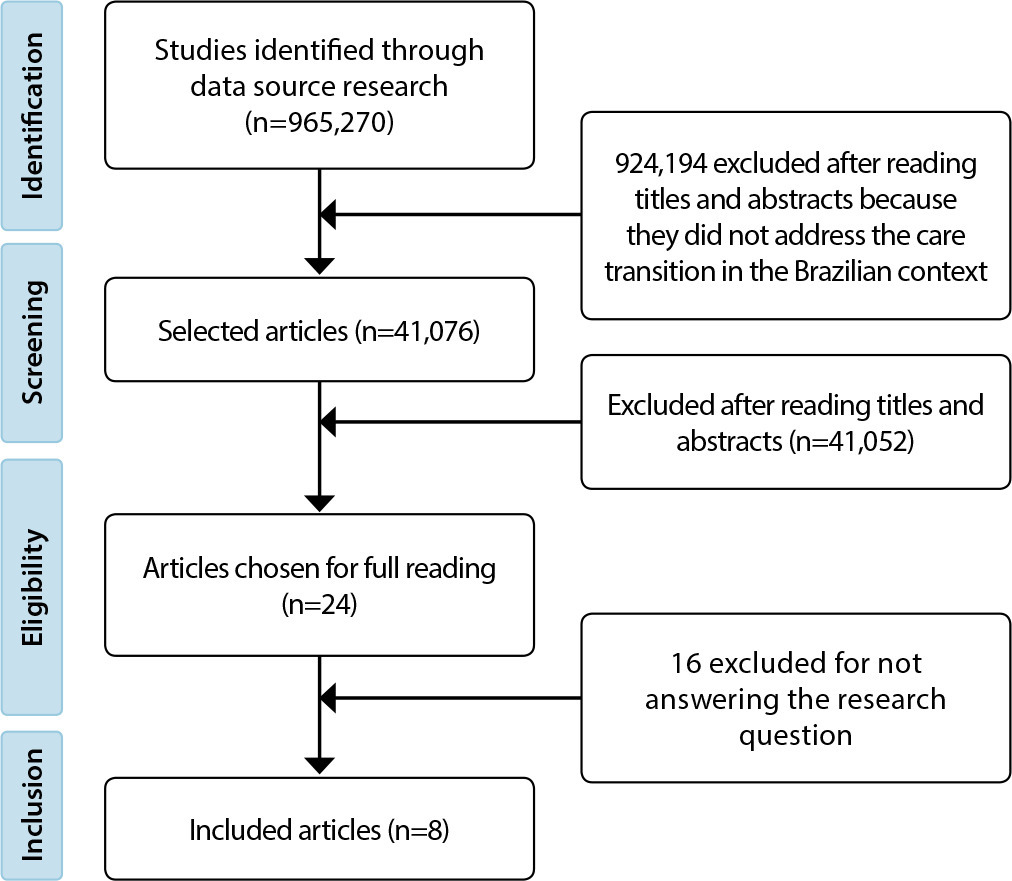
-
ORIGINAL ARTICLE12-04-2023
Effect of cardiovascular biofeedback on nursing staff stress: a randomized controlled clinical trial
Revista Brasileira de Enfermagem. 2023;76(6):e20230069
Abstract
ORIGINAL ARTICLEEffect of cardiovascular biofeedback on nursing staff stress: a randomized controlled clinical trial
Revista Brasileira de Enfermagem. 2023;76(6):e20230069
DOI 10.1590/0034-7167-2023-0069
Views0See moreABSTRACT
Objective:
to assess the effect of cardiovascular biofeedback on nursing staff stress when compared to an activity without self-monitoring.
Method:
a randomized controlled clinical trial, carried out with nursing professionals from a university hospital. The intervention group (n=58) performed cardiovascular biofeedback, and the control (n=57) performed an online puzzle without self-monitoring, totaling nine meetings over three weeks. The outcome was assessed using the Stress Symptoms and Work-Related Stress scales, and the biological marker heart rate variability. The generalized estimating equations method was used.
Results:
the intervention had no effect on self-reported instruments (p>0.050). However, there was an effect of time (p<0.050) on all heart rate variability indicators, demonstrating changes over the sessions.
Conclusion:
cardiovascular biofeedback showed promising results in the biological marker, suggesting that it can be used in nursing staff as a complementary therapy by promoting better autonomic nervous system regulation.

-
ERRATUM12-04-2023
ERRATUM
Revista Brasileira de Enfermagem. 2023;76(6):e2023n6e06
Abstract
ERRATUMERRATUM
Revista Brasileira de Enfermagem. 2023;76(6):e2023n6e06
DOI 10.1590/0034-7167.20237606e06
Views0In the article “Undergraduate nursing students’ knowledge and experience in infusion therapy and peripheral vascular acces”, with DOI number: , published in Revista Brasileira de Enfermagem, 2023;76(3): e20220219, authored:Where it read:[…]See more
-
REVIEW12-16-2024
Recommendations for guidelines for promoting mental health in the workplace: an umbrella review
Revista Brasileira de Enfermagem. 2024;77(6):e20240086
Abstract
REVIEWRecommendations for guidelines for promoting mental health in the workplace: an umbrella review
Revista Brasileira de Enfermagem. 2024;77(6):e20240086
DOI 10.1590/0034-7167-2024-0086
Views1See moreABSTRACT
Objectives:
to summarize the recommendations of guidelines for promoting mental health in the workplace.
Methods:
an umbrella review, according to Joanna Briggs Institute and Preferred Reporting Items for Systematic reviews and Meta-Analyses methodological assumptions. Data collection was carried out in January 2021 and updated in July 2023 in the American Psychological Association, Cochrane Library, EMBASE, National Library of Medicine, and Scopus databases. Systematic reviews that assessed guidelines with recommendations for mental health care for workers were included. PROSPERO registration CRD42023461845.
Results:
four systematic reviews published between 2015 and 2018 were identified. The abstracts highlighted actions that facilitate and inhibit the recommendations as well as three categories of intervention: primary prevention – worker protection; secondary prevention – promoting workers’ mental health; and tertiary prevention – supporting, monitoring and rehabilitating workers upon returning to work.
Conclusions:
the interventions are based on prevention, promotion and early recognition, support and rehabilitation of mental health problems.

-
EDITORIAL03-08-2024
Nursing as a player in tackling vaccine hesitancy and refusal
Revista Brasileira de Enfermagem. 2024;77:e77suppl101
Abstract
EDITORIALNursing as a player in tackling vaccine hesitancy and refusal
Revista Brasileira de Enfermagem. 2024;77:e77suppl101
DOI 10.1590/0034-7167.202477suppl101
Views1Since the 1970s, the Brazilian Ministry of Health established the Brazilian National Immunization Program (PNI – Programa Nacional de Imunização), which preceded the Brazilian Health System and which was incorporated and strengthened due to the decentralized model to municipalities, but under single command at central level. Its objective was and still is to coordinate vaccination […]See more -
ORIGINAL ARTICLE12-21-2020
Development of an appearance validity instrument for educational technology in health
Revista Brasileira de Enfermagem. 2020;73:e20190559
Abstract
ORIGINAL ARTICLEDevelopment of an appearance validity instrument for educational technology in health
Revista Brasileira de Enfermagem. 2020;73:e20190559
DOI 10.1590/0034-7167-2019-0559
Views1ABSTRACT
Objectives:
to develop and evaluate the convergence of the instrument for the appearance validity of educational technologies in health.
Methods:
methodological study conducted in two steps. In step 1, the instrument items were developed, with subsequent content validity by nine specialists in the development of educational technologies in health. In step 2, the convergent validity between another instrument and the appearance instrument was performed. Correlation results above r> 0.3 and p <0.05 were considered as plausible convergent validity.
Results:
the ten items of the initial version of the appearance instrument were submitted to content validity that resulted in a final version with 12 items (Content Validity Index = 0.93). The correlation indexes were strong with the objective and appearance domains; moderate with motivation, organization and total; and weak with writing style.
Conclusions:
the appearance instrument demonstrated content validity and convergent validity, in addition to a strong correlation with the other instrument.
Keywords:Educational TechnologyHealth EducationMethodological Research in NursingTechnological DevelopmentValidation StudiesSee more -
ORIGINAL ARTICLE09-16-2019
Spatial analysis on tuberculosis and the network of primary health care
Revista Brasileira de Enfermagem. 2019;72(5):1197-1202
Abstract
ORIGINAL ARTICLESpatial analysis on tuberculosis and the network of primary health care
Revista Brasileira de Enfermagem. 2019;72(5):1197-1202
DOI 10.1590/0034-7167-2017-0897
Views1See moreABSTRACT
Objective:
to analyze the spatial distribution of new cases of tuberculosis compared to the location of the Primary Healthcare Units that performed the compulsory notification.
Method:
ecological study conducted in Belém, Pará, with 5,294 new cases of tuberculosis notified to Sistema de Informação de Agravos de Notificação for the period from 2010 to 2014. The cases were georeferenced using the software applications ArcGis 10.2 and TerraView 4.2.2. The techniques of Kernel density and global Moran geostatistics were used.
Results:
the incidence of tuberculosis cases did not vary significantly between the years studied, however there was a variation in incidence between neighborhoods. Health units that exhibited higher number of notifications can suffer great influence of migration from nearby neighborhoods.
Conclusion:
the spatial dynamics of tuberculosis associated with health services allows to know the areas with increased risk of tuberculosis and the density of notifications of health units.

-
ORIGINAL ARTICLE10-21-2019
Nurses defending the autonomy of the elderly at the end of life
Revista Brasileira de Enfermagem. 2019;72(6):1639-1645
Abstract
ORIGINAL ARTICLENurses defending the autonomy of the elderly at the end of life
Revista Brasileira de Enfermagem. 2019;72(6):1639-1645
DOI 10.1590/0034-7167-2018-0768
Views1See moreABSTRACT
Objective:
to understand how nurses deal with the elderly’s autonomy at the end of life.
Method:
qualitative, exploratory study, guided by the Grounded Theory. Ten nurses, eight doctors and 15 nursing technicians were interviewed between November 2016 and May 2017 at a university hospital in Rio de Janeiro/Brazil.
Results:
nurses deal with the elderly’s autonomy in compliance with the code of ethics and exercise leadership in actions and interactions to defend this right, evaluating, guiding and listening to the preferences of the elderly; interacting with the family; and sharing information with the health team.
Final considerations:
the elderly’s autonomy must be ensured in care planning, based on patient-centered communication and developed in the interaction among agents involved in care. The discussion on “Living Wills” Health Care Directives and principles of palliative care must be encouraged.
-
ORIGINAL ARTICLE12-05-2019
Care complexity in hospitalized elderly according to cognitive performance
Revista Brasileira de Enfermagem. 2019;72:134-139
Abstract
ORIGINAL ARTICLECare complexity in hospitalized elderly according to cognitive performance
Revista Brasileira de Enfermagem. 2019;72:134-139
DOI 10.1590/0034-7167-2018-0357
Views1See moreABSTRACT
Objective:
to investigate possible differences in care complexity, functional performance and biopsychosocial and health system aspects among hospitalized elderly with or without cognitive decline.
Method:
quantitative, cross-sectional and analytical study in which was used the INTERMED method and cognitive and functional screening scales. We investigated 384 elderly patients admitted to a medical and surgical clinic of a University Hospital located in São Paulo/SP.
Results:
cognitive decline was present in 40.1% of the sample, most of them were longer-lived elderly individuals with less schooling and income, more dependent in activities of daily living and had greater vulnerability in different domains of INTERMED. After adjustments, the elderly with cognitive decline presented greater vulnerability in the psychological domain.
Conclusion:
the relationship between cognitive decline and psychological vulnerability highlights the need to adopt long-term care based on involvement of the family, health team and different services, thereby maximizing the quality of care.
-
ORIGINAL ARTICLE03-09-2020
Quality of life at work in a central sterile processing department
Revista Brasileira de Enfermagem. 2020;73(2):e20180792
Abstract
ORIGINAL ARTICLEQuality of life at work in a central sterile processing department
Revista Brasileira de Enfermagem. 2020;73(2):e20180792
DOI 10.1590/0034-7167-2018-0792
Views1See moreABSTRACT
Objectives:
to evaluate the quality of life of nursing professionals who work in a central sterile processing department.
Methods:
a descriptive, quantitative, exploratory study, conducted with 82 nursing professionals working in the Central Sterile Processing Department of a University Hospital, from September to November 2017. A semi-structured instrument and the questionnaire “Medical Outcomes Study Short-Form 36” were used. Results: most of the participants were female, married, aged 31-40 years; 47.6% with 6-10 years of profession, and 82.9% reported working in CSPD for 1-5 years. The most affected quality of life domains were Pain, Vitality, General Health Status and Social Aspects.
Conclusions:
This study showed a need for rethinking and re-creating the labor dynamics in CSPD to improve the quality of life of these nursing professionals.
-
ORIGINAL ARTICLE07-06-2020
Nurses’ work process in an emergency hospital service
Revista Brasileira de Enfermagem. 2020;73(5):e20180923
Abstract
ORIGINAL ARTICLENurses’ work process in an emergency hospital service
Revista Brasileira de Enfermagem. 2020;73(5):e20180923
DOI 10.1590/0034-7167-2018-0923
Views1ABSTRACT
Objectives:
to analyze the nurses’ work process in an Emergency Hospital Service.
Methods:
a qualitative, exploratory and descriptive research conducted with 17 nurses from the emergency service of a high complexity hospital in southern Brazil. Data were collected through interviews, focus group and document analysis. Data analysis followed the thematic content analysis framework.
Results:
four categories emerged: Work environment characteristics; Assistance dimension; Management dimension; Care management.
Final Considerations:
the nurses’ work process in Emergency Hospital Service is characterized by the peculiarities of the setting, with centrality in care and care management aiming at quality care and safety to patients.
Keywords:Emergency NursingEmergency Service, HospitalHealth ManagementNurse's RoleProfessional PracticeSee more
-
REVIEW12-05-2019
Financial-patrimonial elder abuse: an integrative review
Revista Brasileira de Enfermagem. 2019;72:328-336
Abstract
REVIEWFinancial-patrimonial elder abuse: an integrative review
Revista Brasileira de Enfermagem. 2019;72:328-336
DOI 10.1590/0034-7167-2018-0703
Views0See moreABSTRACT
Objective:
to analyze the available evidence in the nursing literature about financial-patrimonial elder abuse.
Method:
integrative review of articles indexed in the databases CINAHL, Scopus, Web of Science, LILACS and MEDLINE, from 2007 to 2017. The combination of controlled and uncontrolled descriptors was used in Portuguese, English and Spanish.
Results:
15 studies developed in seven countries were included. In the thematic analysis, three categories emerged: epidemiological data, risk factors and institutions providing services to the elderly. The occurrence of this type of violence concomitantly to the other subtypes was highlighted among the most frequent.
Final considerations:
the literature points to important epidemiological data, risk factors and characteristics of this type of violence, including within institutions providing services to the elderly, in different countries, essential aspects for structuring and rethinking public policies for protection and appreciation of the elderly.
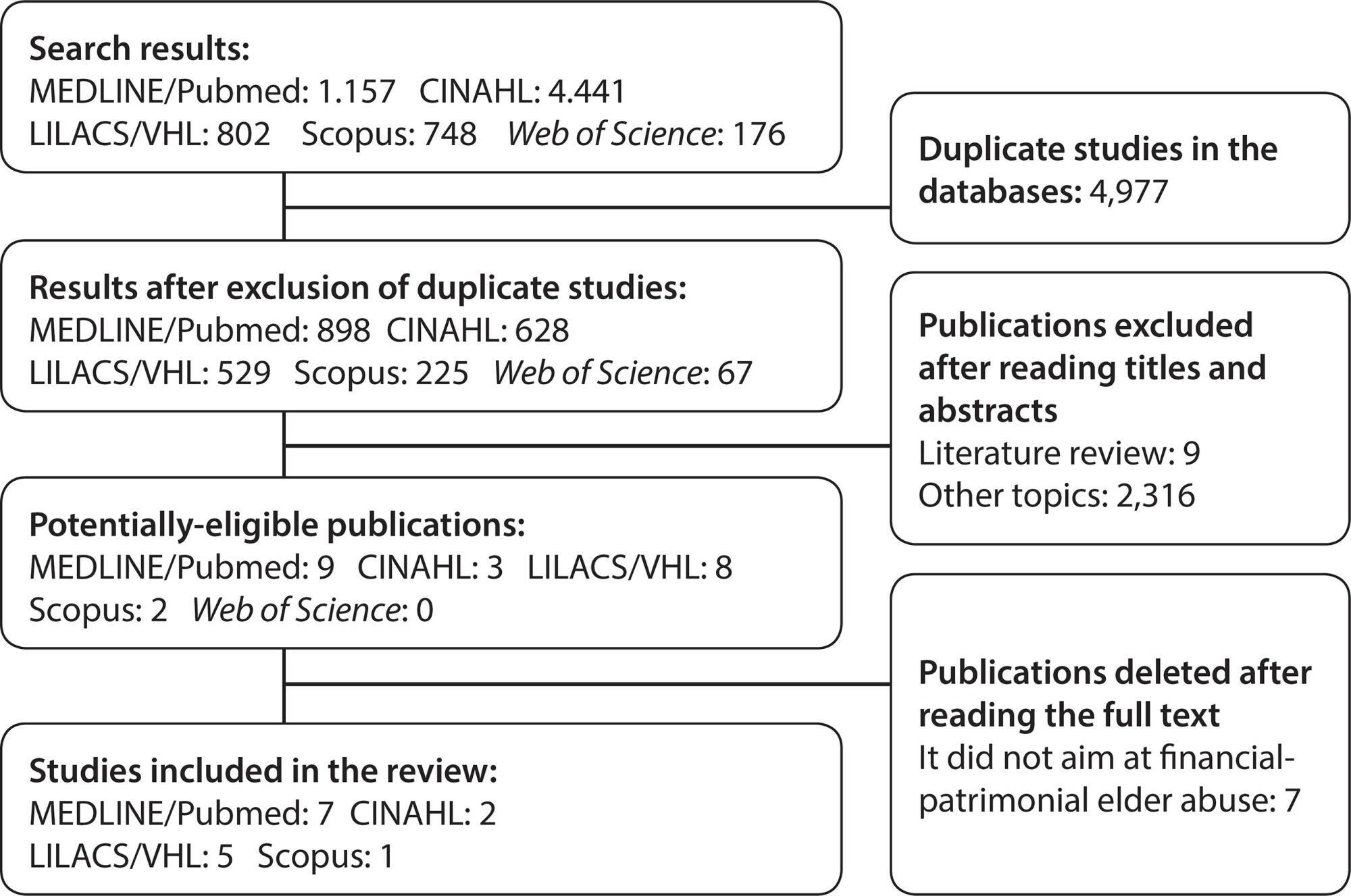
-
ORIGINAL ARTICLE07-06-2020
Vulnerability in the health of young transgender women living with HIV/AIDS
Revista Brasileira de Enfermagem. 2020;73(5):e20190046
Abstract
ORIGINAL ARTICLEVulnerability in the health of young transgender women living with HIV/AIDS
Revista Brasileira de Enfermagem. 2020;73(5):e20190046
DOI 10.1590/0034-7167-2019-0046
Views0ABSTRACT
Objectives:
to analyze the health vulnerability of young female transgender living with HIV/AIDS.
Methods:
qualitative, descriptive, and exploratory study, based on the theoretical reference of Social Representation and concept of vulnerability; developed with six transgender women in a reference Hospital for HIV/AIDS. We analyzed the individual interviews, recorded, and transcribed in full, in the IRaMuTeQ software by Similitude Analysis.
Results:
the thematic categories are listed based on the Ayres reference: 1) Individual dimension of vulnerability to HIV/AIDS; 2) Social dimension of vulnerability to HIV/AIDS; 3) Programmatic dimension of the vulnerability.
Final Considerations:
the young female transsexual living with HIV/AIDS experience a context of vulnerability in health associated with a lack of knowledge and difficulties for the realization of self-care. The study evidenced the representations of social abjection and unpreparedness of the health team that compose the Primary Attention in Health in promoting qualified assistance for the execution of the effective and humanized care.
Keywords:Acquired Immunodeficiency SyndromeHealth VulnerabilityHIV InfectionsNursingTransgender PersonsSee more -
EDITORIAL12-13-2019
Women’s health during pregnancy, childbirth and puerperium: 25 years of recommendations from international organizations
Revista Brasileira de Enfermagem. 2019;72:1-2
Abstract
EDITORIALWomen’s health during pregnancy, childbirth and puerperium: 25 years of recommendations from international organizations
Revista Brasileira de Enfermagem. 2019;72:1-2
DOI 10.1590/0034-7167-2019-72suppl301
Views0Women’s health during pregnancy, childbirth and the puerperium has been a concern of international bodies since the 1994 United Nations International Conference on Population and Development in Cairo, Egypt. This conference had as theme Women’s Health and Safe Motherhood. The rationale for choosing the theme was that pregnancy and childbirth-related complications were among the leading […]See more -
ORIGINAL ARTICLE04-22-2020
(Dis)continuation of care of the pre-term newborn at the border
Revista Brasileira de Enfermagem. 2020;73(3):e20180827
Abstract
ORIGINAL ARTICLE(Dis)continuation of care of the pre-term newborn at the border
Revista Brasileira de Enfermagem. 2020;73(3):e20180827
DOI 10.1590/0034-7167-2018-0827
Views0See moreABSTRACT
Objectives:
to understand how continuation of care for the preterm newborn in the health care network at the border.
Methods:
the Grounded Theory was the methodological framework. Data were collected through 17 semi-structured interviews between July 2016 and March 2017.
Results:
“Describing the structure and functioning of the Child Nutrition Center” represents the context; “Experiencing and signifying premature birth” are the causal conditions; “Identifying conditions that intervene in the process of continuation of care for the preterm newborn” are the intervening conditions; “Ensuring continuation of care for the preterm newborn” are strategies; “Identifying (dis)continuation of care flows for the preterm newborn at the border” are the study’s consequences and phenomenon.
Final Considerations:
there is a need to plan referral and counter-referral flows of the preterm newborn and the commitment of public health managers to ensure continuation of care.
-
ORIGINAL ARTICLE05-09-2022
Wise Infant Development®: creation of a software for teaching in pediatric nursing education
Revista Brasileira de Enfermagem. 2022;75(5):e20210466
Abstract
ORIGINAL ARTICLEWise Infant Development®: creation of a software for teaching in pediatric nursing education
Revista Brasileira de Enfermagem. 2022;75(5):e20210466
DOI 10.1590/0034-7167-2021-0466
Views0See moreABSTRACT
Objectives:
to create a software application for nursing education on child development assessment.
Methods:
this is a methodological applied research developed in three stages: analysis, design, and development. Product quality characteristics from the ISO/IEC 25010 standards were adopted. The programming language used was JavaScript. The educational software was developed based on a constructivist cognitive theory.
Results:
it was possible to create the software from the following quality metrics: functional suitability, reliability, usability, performance efficiency, compatibility, security, maintainability, and portability. The technology addresses child development in physical, cognitive, and psychosocial domains and how this assessment should be carried out in Brazil. The software has pre and posttests, 5 learning modules, certificate issuance, support for doubts, and an administrative panel. Final Considerations: it is concluded that the software adds to the existing tools for child development monitoring, facilitating students’ knowledge acquisition in promoting child health.
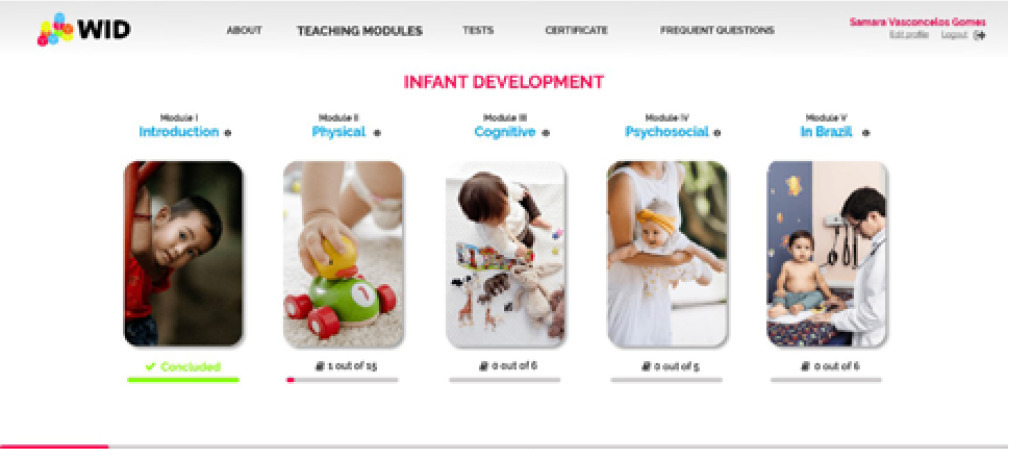
-
EDITORIAL12-04-2023
Nursing and the Sustainable Development Goals (SDGs): An Essential Commitment
Revista Brasileira de Enfermagem. 2023;76(6):e760601
Abstract
EDITORIALNursing and the Sustainable Development Goals (SDGs): An Essential Commitment
Revista Brasileira de Enfermagem. 2023;76(6):e760601
DOI 10.1590/0034-7167.2023760601
Views0The Sustainable Development Goals (SDGs) are a global initiative launched by the United Nations (UN) in September 2015 as part of the 2030 Agenda for Sustainable Development, whose objectives summarize a universal call to action to end poverty, protect the environment and ensure that all people have access to opportunities and well-being, all in an […]See more -
REVIEW04-22-2022
Health needs of mothers of children with Congenital Zika Syndrome: an integrative review
Revista Brasileira de Enfermagem. 2022;75:e20210540
Abstract
REVIEWHealth needs of mothers of children with Congenital Zika Syndrome: an integrative review
Revista Brasileira de Enfermagem. 2022;75:e20210540
DOI 10.1590/0034-7167-2021-0540
Views0ABSTRACT
Objectives:
to evidence and analyze the health needs of mothers of children with Congenital Zika Syndrome.
Methods:
a total of 44 articles published between October/2015 and March/2021 on PubMed, LILACS, Scopus, Web of Science and Science Direct were included. The RTI bank and CASP score were applied to classify the methodological quality of the studies. Reflective content analysis and Cecílio and Matsumoto’s taxonomy were used for analysis. Visual map was used as a technique for presenting the results.
Results:
mothers need access to social protection, family-centered, multi-professional empathetic monitoring, cultivating bonds and affection by professionals, sharing of care between health network services, strengthening the social support network and fostering coexistence groups between them.
Final Considerations:
intersectoral initiatives must be implemented for better housing conditions, fighting stigma, holding parents accountable and resuming life project.
Keywords:CaregiversCongenital AbnormalitiesHealth Service Needs and DemandMaternal and Child HealthZika Virus InfectionSee more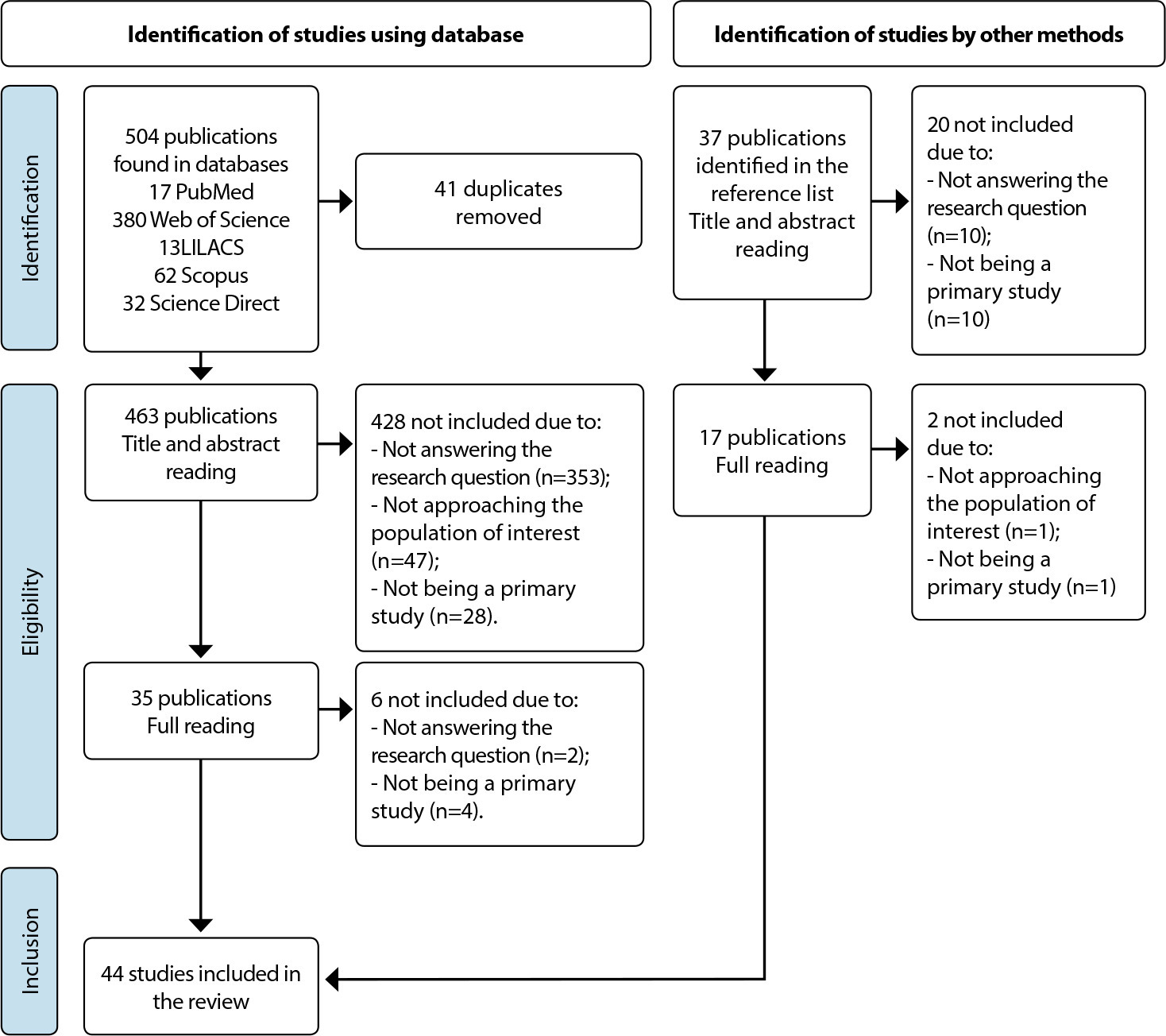
-
REFLECTION12-21-2020
War against the COVID-19 pandemic: reflection in light of Florence Nightingale’s nursing theory
Revista Brasileira de Enfermagem. 2020;73:e20200371
Abstract
REFLECTIONWar against the COVID-19 pandemic: reflection in light of Florence Nightingale’s nursing theory
Revista Brasileira de Enfermagem. 2020;73:e20200371
DOI 10.1590/0034-7167-2020-0371
Views0See moreABSTRACT
Objective:
To reflect on the relationship and importance of the environmental theory regarding practices for promotion, prevention, and treatment of COVID-19.
Methods:
A theoretical-reflexive study about the COVID-19 pandemic in light of the environmental theory proposed by Florence Nightingale.
Results:
It is observed that the application of the theoretical foundations proposed by the environmental theory is related to the current practices used in the fight against the COVID-19 pandemic.
Final Considerations:
It is believed that the theoretical basis is fundamental for the critical-reflexive training of the nursing professional, for the consolidation of Nursing as a science; therefore, it could provide a foundation in nowadays battle against the pandemic.
Search
Search in:
Nuvem de Tags
Aged (144) Atenção Primária à Saúde (239) COVID-19 (104) Cuidados de Enfermagem (269) Educação em Enfermagem (151) Educação em Saúde (139) Enfermagem (930) Estudos de Validação (131) Health Education (144) Idoso (208) Mental Health (149) Nursing (987) Nursing Care (306) Patient Safety (151) Primary Health Care (284) Qualidade de Vida (104) Quality of Life (106) Saúde Mental (145) Segurança do Paciente (150) Validation Studies (108)




